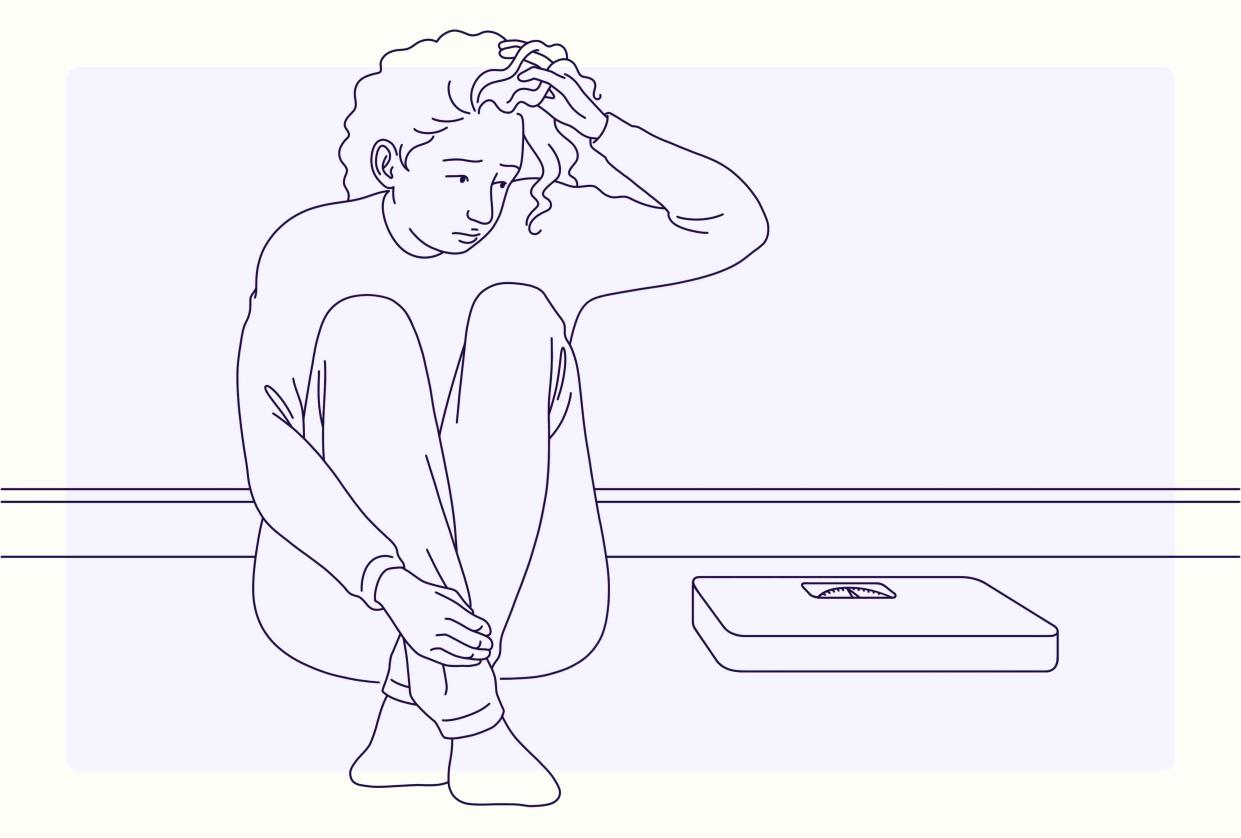What Is Bulimia Nervosa?

Mira Norian
Medically reviewed by Elizabeth Barnes, RDN
Bulimia nervosa (also called bulimia) is a type of eating disorder. People with bulimia have regular episodes of eating large amounts of food and often feel a loss of control over their eating—a concept known as binge eating. In response to a binge eating episode, they may try different ways to get rid of the food or prevent weight gain. These methods include:
Vomiting or taking laxatives
Fasting (not eating food)
Exercising more than normal
Anyone can develop bulimia, but women—particularly teenage girls and young women—are more likely to receive a diagnosis for the condition. The exact cause of bulimia is unknown, but researchers suspect that a combination of genetic, psychological, and cultural factors may play a role.
As with any eating disorder, recovery can be a lengthy process. Although it is a long-term condition, most people will recover from bulimia with proper treatment and support.
Symptoms
Bulimia occurs in cycles of binge eating followed by purging behaviors. During eating binges, you may quickly eat large amounts of high-calorie foods in a short period of time. You may feel a loss of control over what or how much you are eating to the point of nausea and discomfort. Binges may happen several times a day for many months at a time.
After binge eating, most people with the condition employ methods to prevent weight gain. This is known as compensatory behaviors (or, purging). Purging includes behaviors like fasting, vomiting, using laxatives or diuretics, or exercising too much.
Over time, binging and purging can affect your body, causing a variety of symptoms such as:
Chronic (long-term or recurring ) sore throat
Acid reflux or heartburn
Stomach pain
Swelling in your cheeks or jaw
Tooth decay and sensitivity
Severe dehydration
Feeling dizzy or faint
Irregular periods or not having a period at all
It’s important to note that it’s often difficult to tell if someone has bulimia based on their weight alone. Anyone of any weight or body type can live with bulimia. And while bulimia is more common in women, the condition is often underdiagnosed in men—meaning, men can still experience symptoms but typically receive a diagnosis at lower rates.

dragana991 / Getty Images
Causes of Bulimia
The cause of bulimia is unknown. However, researchers suspect genetic, psychological, and cultural factors can increase the risk of developing the condition. These risk factors can include:
Dieting and unhealthy weight-control behaviors that start at a young age
Societal or cultural pressures on beauty, weight, and body shape
Sexual assault or abuse
A need for control by regulating what you eat and how you look
Body dissatisfaction
Low levels of serotonin and dopamine in the brain (which are chemicals that control satisfaction and mood)
Having a family history of eating disorders
Diagnosis
If you suspect that you or a loved one are displaying symptoms of an eating disorder, it’s always a good idea to make an appointment with your healthcare provider. Your provider will begin by first taking your medical history and asking questions about your eating and exercise habits. These questions are based on the Diagnostic and Statistical Manual of Mental Disorders (DSM)—a manual that contains criteria to help diagnose a variety of psychiatric conditions.
To help establish a bulimia diagnosis, your healthcare provider will evaluate you for the following symptoms. Keep in mind: these symptoms must be occurring at least once a week for three months:
Episodes of binge eating: A loss of control while eating large amounts of food in less than two hours
Compensatory behaviors to prevent weight gain: The use of fasting, self-induced vomiting, excessive physical activity, laxatives, or diuretics immediately after an episode of binging
Additionally, a physical exam will help your healthcare provider detect signs or symptoms of bulimia. The exam may show:
Broken blood vessels in the eyes due to strain from vomiting
Small cuts or calluses on the tops of the finger joints due to forcing oneself to vomit
Cavities, gum infections, or tooth erosion due to exposure to stomach acid through frequent vomiting
Your healthcare provider will likely also order blood work and other lab tests. This is to help rule out other conditions that may explain your symptoms or detect bulimia-related health problems. These tests may include a blood test for electrolyte imbalance or dehydration or an electrocardiogram (ECG or EKG)—which is a test to check for heart conditions.
Treatment for Bulimia
It’s important to seek treatment early for bulimia. The main goal of treatment is to stop and prevent the cycle of binging and purging behaviors. Your healthcare team may include your primary care physician, a nutritionist, a mental health professional, and an eating disorder specialist.
Generally, the first line of treatment for bulimia is medication. Prozac (fluoxetine) is the only medication that the Food and Drug Administration (FDA) has currently approved to treat bulimia. Prozac is an antidepressant that may help with binging and purging and improving thoughts about eating. Other antidepressants that your care team may prescribe you include Celexa (citalopram) and Zoloft (sertraline).
Medication therapy is only one part of bulimia treatment. Your treatment plan may also include a combination of:
Psychotherapy: Counseling can help you manage harmful thoughts or behaviors
Support groups: Recovering from bulimia brings a range of emotions and sharing your feelings with others who have similar experiences can help you feel less alone
Nutritional counseling: A registered dietician can help you learn how to improve eating behaviors and create an eating plan that works best for you
How to Prevent Bulimia Relapse
The exact cause of bulimia is unknown, so there isn’t a way to prevent the condition itself. However, there are ways to prevent bulimia episodes from recurring. Research has shown that preventive programs can help you identify and address bulimia-related risk factors like dieting, idealization of thinness, and body dissatisfaction. If you think a prevention program may be right for you, talk to your provider about your options.
The road to recovery can be difficult with eating disorders like bulimia. Common warning signs of a bulimia relapse can look like:
Isolating from your loved ones
Concealing information from your healthcare team
Not using healthy coping mechanisms to deal with increased stress
Experiencing perfectionism, anxiety, or depression
Avoiding meals or events that involve food
It’s important to identify your unique triggers that can make the recovery process more challenging. While living with bulimia is not easy, it’s important to do your best in being proactive in your treatment plan. You may find it helpful to make a plan on how to manage triggers and identify your sources of support such as trusted friends, loved ones, or healthcare professionals.
Related: How To Start Eating Healthy: 10 Changes You Can Make
Related Conditions
People with bulimia are more likely to have mental health comorbidities—or conditions that commonly co-occur with bulimia. These conditions may exist before or develop shortly after a bulimia diagnosis. These co-occurring or comorbid conditions can include:
Major depression disorder (MDD)
Social anxiety or phobia (fear)
Substance use disorder
Unfortunately, suicidal thinking and attempts are also common in people living with bulimia. When left untreated, these mental health conditions can lead to worsening bulimia. As a result, diagnosing and treating these conditions can improve the outcome of bulimia treatment.
If you are experiencing a crisis, or know someone who is, call or text the National Suicide Prevention Lifeline at 988 for free and confidential support 24/7. You can also visit SpeakingOfSuicide.com/resources for a list of additional resources.
Binging and purging behaviors related to bulimia can sometimes also cause new medical conditions to develop. These medical complications range from mild to life-threatening and may include:
Constipation
Hemorrhoids
Cardiac arrhythmias (irregular heartbeat)
Damage to the pancreas
An inability for the muscle in your esophagus to relax (achalasia)
Living with Bulimia
If you are living with bulimia, it may be hard to talk about your binging, purging, or exercise behaviors. However, sharing your feelings with a trusted loved one or a healthcare provider can help. It’s OK to be nervous if you’re going into your first appointment to talk about your symptoms. You may find it helpful to bring a loved one to the appointment with you.
It’s important to remember that talking with your primary healthcare provider and mental health professional can help them create a treatment plan that works best for you and your needs.
It is not uncommon for people to stop their treatment plan for various reasons. Before starting treatment, people living with bulimia need to know that:
Your care team will likely recommend more than one type of therapy to manage bulimia
The recovery process can bring up negative emotions
It’s common for bulimia to return or relapse, but do your best to not give up if and when challenges arise
Although it is a long-term condition, most people will recover from bulimia with proper treatment. As with any eating disorder, recovery can sometimes be a long and difficult process. Keep in mind: actively engaging in your treatment plan and leaning on others for support can help you improve symptoms and prevent bulimia-related medical complications from occurring.
For more Health.com news, make sure to sign up for our newsletter!
Read the original article on Health.com.

